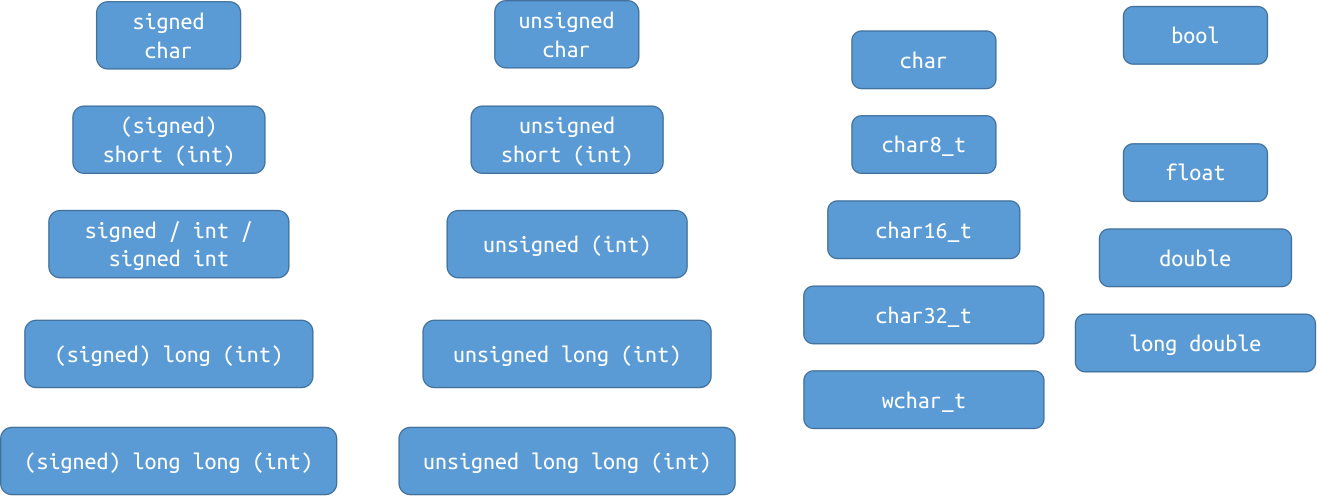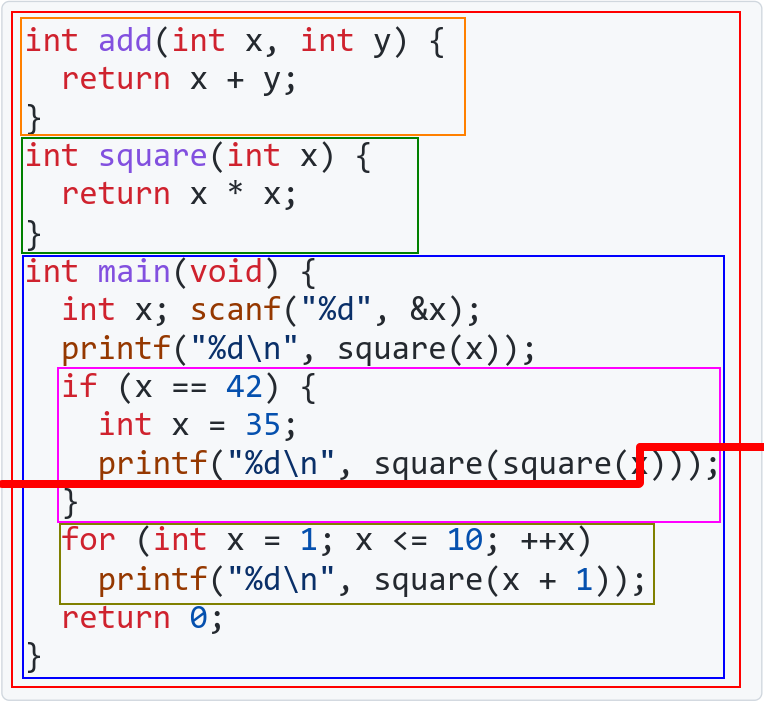CS100 Lecture 10
C Summary
Contents
- C summary
- Types
- Variables
- Expressions
- Control flow
- Functions
- Standard library
- Example:
Vector
C Summary
Types
Types are fundamental to any program: They tell us what our data mean and what operations we can perform on those data.
C is a statically-typed language: The type of every expression (except those involving VLAs) is known at compile-time.
Arithmetic types
Arithmetic types
1 == sizeof(char) <= sizeof(short) <= sizeof(int) <= sizeof(long) <= sizeof(long long)sizeof(signed T) == sizeof(unsigned T)for everyT\(\in\{\)char,short,int,long,long long\(\}\)shortandintare at least 16 bits.longis at least 32 bits.long longis at least 64 bits.- Range of signed types: \(\left[-2^{N-1},2^{N-1}-1\right]\). Range of unsigned types: \(\left[0,2^N-1\right]\).
- Whether
charis signed or not is implementation-defined. - Signed integer overflow is undefined behavior.
- Unsigned arithmetic never overflows: It is performed modulo \(2^N\), where \(N\) is the number of bits of that type.
Pointer types
PointeeType *
- For
T\(\neq\)U,T *andU *are different types. - The value of a pointer of type
T *is the address of an object of typeT. - Null pointer: The pointer holding the null pointer value, which is a special value indicating that the pointer is "pointing nowhere".
- A null pointer can be obtained from
NULL. &varreturns the address ofvar. The return type is pointer to the type ofvar.- Only when a pointer is actually pointing to an object is it dereferenceable.
*ptr, whereptris not dereferenceable, is undefined behavior.
Array types
ElemType [N]
T [N],U [N]andT [M]are different types forT\(\neq\)UandN\(\neq\)M.Nshould be compile-time constant. Otherwise it is a VLA.- Valid index range: \([0,N)\). Subscript out of range is undefined behavior.
- Decay:
a\(\to\)&a[0],T [N]\(\to\)T *.
Pointer to array: T (*)[N]. Array of pointers: T *[N].
struct types
A special data type consisting of a sequence of members.
- The type name is
struct StructName. - \(\displaystyle \mathtt{sizeof(struct\ \ X)}\geqslant\sum_{\mathtt{member}\in\mathtt{X}}\mathtt{sizeof(member)}\)
Variables
Declare a variable: Type varName
ElemType varName[N]for array typeElemType[N].T (*varName)[N]for pointer to array typeT (*)[N].
Initialize a variable: = initializer
- Brace-enclosed list initializer for arrays and
structs:= { ... }. - Designators for arrays:
= {[3] = 5, [7] = 4} - Designators for
structs:= {.mem1 = x, .mem2 = y}.
Initialization
If a variable is declared without explicit initializer:
- For global or local
staticvariables, they are empty-initialized: 0for integer types,+0.0for floating-point types,- null pointer value for pointer types.
- For local non-
staticvariables, they are uninitialized, holding indeterminate values.
These rules apply recursively to the elements of arrays and the members of structs.
Any use of the value of an uninitialized variable is undefined behavior.
Scopes and name lookup
Expressions
Expressions = operators + operands.
- Operator precedence, associativity, and evaluation order of operands
f() + g() * h(),f() - g() + h()- The only four operators whose operands have deterministic evaluation order:
&&and||: short-circuit evaluation?:,(not in a function call or in an initializer list)
Expressions
- If the evaluation order of
AandBis unspecified, and if - both
AandBcontain a write to an object, or - one of them contains a write to an object, and the other one contains a read to that object
then the behavior is undefined.
Arithmetic operators
+, -, *, /, %
- Division: truncated towards zero.
- Remainder:
(a / b) * b + (a % b) == aalways holds. - For
+,-,*and/, the operands undergo a series of type conversions to a common type.
Bitwise operators: ~, &, |, ^, <<, >>
Compound assignment operators: a op= b is equivalent to a = a op b.
Be careful with signed overflows.
Pointer arithmetic
- Pointer arithmetic:
p++,++p,p--,--p,p + i,i + p,p - i,p += i,p -= i,p1 - p2. - Pointer arithmetic uses the units of the pointed-to type.
p + i == (char *)p + i * sizeof(*p)- Pointer arithmetic must be performed within an array (including its past-the-end position), otherwise the behavior is undefined.
Operators
++, --
++aand--areturns the value ofaafter incrementation/decrementation.a++anda--returns the original value ofa.
<, <=, >, >=, ==, !=
- The operands undergo a series of type conversions to a common type before comparison.
Operators
Member access: obj.member.
Member access through pointer: ptr->member, which is equivalent to (*ptr).member.
.has higher precedence than*, so the parentheses around*ptrare necessary.
Control flow
if (cond) stmtif (cond) stmt1 else stmt2for (init_expr; cond; inc_expr) stmtwhile (cond) stmtdo stmt while (cond);switch (integral_expr) { ... }breakandcontinue
Functions
Function declaration: RetType funcName(Parameters);
- Parameter names are not necessary, but types are required.
- A function can be declared multiple times.
Function definition: RetType funcName(Parameters) { functionBody }
- A function can be defined only once.
Functions
-
Argument passing:
-
Use the argument to initialize the parameter.
- The semantic is copy.
- Decay always happens: One can never declare an array parameter.
The main function
Entry point of the program (after initialization of all global and local static variables).
One of the following signatures:
int main(void) { ... }int main(int argc, char **argv) { ... }, for passing command-line arguments./* another implementation-defined signature */
Return value: 0 to indicate that the program exits successfully.
Standard library
- IO library
<stdio.h>:scanf,printf,fgets,puts,putchar,getchar, ... - String library
<string.h>:strlen,strcpy,strcmp,strchr, ... - Character classification
<ctype.h>:isdigit,isalpha,tolower, ... <stdlib.h>: Several general-purpose functions:malloc/free,rand, ...<limits.h>: Defines macros likeINT_MAXthat describe the limits of built-in types.<math.h>: Mathematical functions likesqrt,sin,acos,exp, ...
Example: Vector
A "vector" in linear algebra:
It consists of two things: A sequence of \(n\) numbers, and its dimension \(n\).
Example: Vector
struct Vector {
double *entries;
size_t dimension;
};
Do not name them with x and n!
[Best practice] Use meaningful names in programs.
Creation and destruction
struct Vector create_vector(size_t n) {
return (struct Vector){.entries = calloc(n, sizeof(double)),
.dimension = n};
}
void destroy_vector(struct Vector *vec) {
free(vec->entries);
// Do we need to free(vec)?
}
Usage:
struct Vector v = create_vector(10);
// some operations ...
destroy_vector(&v);
"Deep copy" of Vector
The default copy semantics of Vector is not satisfactory:
struct Vector v = something();
struct Vector u = v;
Now u.entries and v.entries point to the same memory block!
destroy_vector(&u);
destroy_vector(&v); // undefined behavior: double free!
"Deep copy" of Vector
void vector_assign(struct Vector *to, const struct Vector *from) {
to->entries = malloc(from->dimension * sizeof(double));
memcpy(to->entries, from->entries, from->dimension * sizeof(double));
to->dimension = from->dimension;
}
Is this correct?
"Deep copy" of Vector
free the memory block that is not used anymore!
void vector_assign(struct Vector *to, const struct Vector *from) {
free(to->entries); // Don't forget this!!
to->entries = malloc(from->dimension * sizeof(double));
memcpy(to->entries, from->entries, from->dimension * sizeof(double));
to->dimension = from->dimension;
}
Is this correct?
"Deep copy" of Vector
void vector_assign(struct Vector *to, const struct Vector *from) {
free(to->entries); // Don't forget this!!
to->entries = malloc(from->dimension * sizeof(double));
memcpy(to->entries, from->entries, from->dimension * sizeof(double));
to->dimension = from->dimension;
}
What happens if to == from?
- This is not impossible. Consider
vector_assign(&vecs[i], &vecs[j])whereiandjhave a chance to be equal.
"Deep copy" of Vector
void vector_assign(struct Vector *to, const struct Vector *from) {
free(to->entries); // Don't forget this!!
to->entries = malloc(from->dimension * sizeof(double));
memcpy(to->entries, from->entries, from->dimension * sizeof(double));
to->dimension = from->dimension;
}
What happens if to == from?
- This is not impossible. Consider
vector_assign(&x[i], &x[j])whereiandjhave a chance to be equal. - The memory block is
freed, and the data are gone.
"Deep copy" of Vector
void vector_assign(struct Vector *to, const struct Vector *from) {
if (to == from)
return;
free(to->entries); // Don't forget this!!
to->entries = malloc(from->dimension * sizeof(double));
memcpy(to->entries, from->entries, from->dimension * sizeof(double));
to->dimension = from->dimension;
}
Why do we declare the parameters as pointers?
"Deep copy" of Vector
void vector_assign(struct Vector *to, const struct Vector *from) {
if (to == from)
return;
free(to->entries); // Don't forget this!!
to->entries = malloc(from->dimension * sizeof(double));
memcpy(to->entries, from->entries, from->dimension * sizeof(double));
to->dimension = from->dimension;
}
Why do we declare the parameters as pointers?
- For
to, we need to modify it. - For
from, this is a read-only operation. Pass the address to avoid copies.
Equality comparison
bool vector_equal(const struct Vector *lhs, const struct Vector *rhs) {
if (lhs->dimension != rhs->dimension)
return false;
for (size_t i = 0; i != lhs->dimension; ++i)
if (lhs->entries[i] != rhs->entries[i])
return false;
return true;
}
Here we use != to compare two doubles directly. It's better to use \(|a-b|>\epsilon\), considering the floating-point errors.
lhs and rhs are pointers, to avoid unnecessary copies.
Basic operations on Vector
struct Vector vector_add(const struct Vector *lhs, const struct Vector *rhs) {
assert(lhs->dimension == rhs->dimension);
struct Vector result = create_vector(lhs->dimension);
for (size_t i = 0; i != lhs->dimension; ++i)
result.entries[i] = lhs->entries[i] + rhs->entries[i];
return result;
}
struct Vector vector_scale(const struct Vector *lhs, double scale) {
struct Vector result = create_vector(lhs->dimension);
for (size_t i = 0; i != lhs->dimension; ++i)
result.entries[i] = lhs->entries[i] * scale;
return result;
}
For vector_add, our design is to claim that "the behavior is undefined if the vectors have different dimensions".
Dot product, norm and distance (\(\ell_2\))
double vector_dot_product(const struct Vector *lhs, const struct Vector *rhs) {
assert(lhs->dimension == rhs->dimension);
double result = 0;
for (size_t i = 0; i != lhs->dimension; ++i)
result += lhs->entries[i] * rhs->entries[i];
return result;
}
double vector_norm(const struct Vector *vec) {
return sqrt(vector_dot_product(vec, vec));
}
double vector_distance(const struct Vector *lhs, const struct Vector *rhs) {
struct Vector diff = vector_minus(lhs, rhs); // Define this on your own.
return vector_norm(&diff);
}
For vector_dot_product, our design is to claim that "the behavior is undefined if the vectors have different dimensions".
Print a Vector
void print_vector(const struct Vector *vec) {
putchar('(');
if (vec->dimension > 0) {
printf("%lf", vec->entries[0]);
for (size_t i = 1; i != vec->dimension; ++i)
printf(", %lf", vec->entries[i]);
}
putchar(')');
}
Exercise
What if we want to increase the dimension of a Vector? Implement the related functionality that reallocates a larger block of memory when needed.
void vector_push_back(struct Vector *vec, double x) {
if (/* reallocation is needed */)
vector_grow(vec); // Implement this function
vec->entries[vec->dimension++] = x;
}
You may need to add members to struct Vector.
What we have done
struct Vector {
double *entries;
size_t dimension;
};
struct Vector create_vector(size_t n);
void destroy_vector(struct Vector *vec);
void vector_assign(struct Vector *to, const struct Vector *from);
bool vector_equal(const struct Vector *lhs, const struct Vector *rhs);
struct Vector vector_add(const struct Vector *lhs, const struct Vector *rhs);
struct Vector vector_minus(const struct Vector *lhs, const struct Vector *rhs);
struct Vector vector_scale(const struct Vector *lhs, double scale);
double vector_dot_product(const struct Vector *lhs, const struct Vector *rhs);
double vector_norm(const struct Vector *vec);
double vector_distance(const struct Vector *lhs, const struct Vector *rhs);
void print_vector(const struct Vector *vec);
Problems of the current implementation
- The call to
create_vectoris not mandatory. One can easily create aVectorwith some garbage values. destroy_vectoris not called automatically. If we forget to call it manually, memory leak happens.- We always need to pass the address of
Vectors to these functions. The extra&and*are annoying. - The "deep copy" is implemented by a function, but the default copy semantics are still there. If we forget to call
vector_assignwhen copying aVector, disaster will happen. - No prevention from modifying a
Vector: Disaster is caused easily by a simplefree(vec->entries);.
Problems of the current implementation
- The named functions are inconvenient: To compute \(\mathbf u^T(\mathbf v+2\mathbf w)\), we need to write
c
struct Vector scaled = vector_scale(&w, 2);
struct Vector added = vector_add(&v, &scaled);
return vector_dot_product(&u, &added);
Can we express it directly by return u * (v + 2 * w);?
- ......
We will see the solutions to these problems in C++, by data abstraction, and by OOP (object-oriented programming).
Enter the world of C++ ...
From The Design and Evolution of C++, by Bjarne Stroustrup who invented C++:
C++ is a general-purpose programming language that - is a better C, and - supports data abstraction, and - supports object-oriented programming.
#include <iostream>
int main() {
std::cout << "Hello world\n";
return 0;
}


